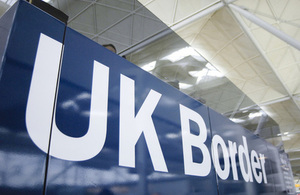Report finds 40% of planned deportations were cancelled
The Independent Chief Inspector of Borders and Immigration last week published a report on enforced removals undertaken by private companies contracted by the Home Office.
 Image credit: UK GovernmentThe report – An Inspection of Home Office Outsourced Contracts for Escorted and Non-Escorted Removals and Cedars Pre-Departure Accommodation – can be read here.
Image credit: UK GovernmentThe report – An Inspection of Home Office Outsourced Contracts for Escorted and Non-Escorted Removals and Cedars Pre-Departure Accommodation – can be read here.
It examines three areas: 1) the escorting of migrants to the country to which they are being returned; 2) the provision of travel tickets for escorts and returnees, including those returned unescorted; 3) the Cedars Pre-Departure Accommodation (PDA) opened in 2011 for families with children under the age of 18 subject to enforced removal.
In an article on the report, the Guardian highlighted how the Chief Inspector found plans to remove foreign criminals and immigrants living in Britain illegally were cancelled in 40% of cases.
According to BBC News, this amounted to almost 34,000 cancelled airline tickets in one 18-month period, with lack of staff to escort detainees being one reason for so many cancellations.
BBC News added that the Home Office said work was "already under way to address the recommendations relating to ticketing and escorting" and it accepted all of the Chief Inspector's recommendations.
The Chief Inspector's report makes eight recommendations:
1. In order to reduce the logistical difficulties and additional costs created by late changes to escorted removals, work with Tascor to improve the usefulness of the Electronic Request Form (ERF) for risk assessing escorted removals and allocating escorts, and consider what of the additional information provided at the 72 hour point could be provided earlier.
2. Regularly review by business area and/or removal category the percentage of, and reasons for, cancelled or failed removals, including those deemed 'out of [Home Office] control', and set a common threshold, and develop guidance for caseworkers, for when to request refundable tickets.
3. Put in place (and monitor) a process that ensures that where travel tickets have been purchased for an unescorted or escorted removal and the removal is cancelled or fails:
• the caseworker updates the Case Information Database (CID) and alerts the travel services contractor at the earliest opportunity (so that the contractor can seek the maximum possible refund);
• escorts deployed out of hours and at week-ends alert the travel services contractor at the earliest opportunity, and the escorting contractor confirms to the caseworker that this has been done.
4. Given the co-dependencies of the escorting and travel services contracts, consider re-designating the latter 'Tier 1' and reviewing both together at senior level, where relevant applying the lessons from Moore Stephens and other reviews to both.
5. Having relaxed the current performance regime and reduced Tascor's losses for the remainder of the current escorting contract, press Tascor to deliver as required in relation to the 'significant efficiency improvements' to the removals process envisaged in the Joint Business Plan.
6. Conduct a detailed analysis of the operational and financial impacts of delays between the date requested for a removal and the date when escorts are made available, using the results to improve the effectiveness of current processes and to inform future performance measures, including financial deductions ('service credits').
7. In designing the performance regime for the new escorting and travel services contract(s), ensure that:
• KPIs focus on outcomes, striking a balance between operational delivery and costs (including refunds) and do not distort performance by an over-emphasis on certain activities (e.g. In-Country Escorting (ICE) movements);
• the number of KPIs is manageable for all parties;
• performance data can be monitored and validated independently (where necessary through Home Office direct access to contractors' systems and full data sharing); and
• any deductions (e.g. 'service credits') and conditions (e.g. sliding scales, caps) are correctly applied and used to incentivise continuous improvement and, where appropriate, collaboration between contractors.
8. Conduct a fundamental review of the requirement for Pre-Departure Accommodation for families with children under the age of 18, with a view to providing facilities, including welfare and other essential support, that are appropriate in scale, nature and cost to the projected demand for and proven value of such accommodation.